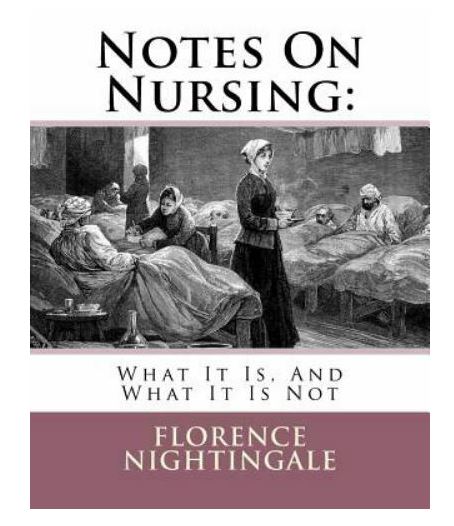
May 6th kicks off the seven-day celebration of Nurses Week and culminates on May 12th, the birthday of the founder of the field of nursing, Florence Nightingale.
Florence established the first professional training school for nurses, the Nightingale Training School at St Thomas’ Hospital in 1860. The school is now part of King’s College London. She published over 200 books, reports, and pamphlets on hospital planning and organization which are still widely read and respected today. Her most famous work is pictured above, Notes on Nursing: What It Is and What It Is Not which still offers nurses relevant content almost two centuries later.
In nursing school, Florence Nightingale‘s history was required reading. But, in my early twenties, I didn’t really grasp the significance of “the Lady with the Lamp” and her contributions until I visited the Florence Nightingale Museum in London, England.
My most meaningful experience as a tourist in London was my stop at the Florence Nightingale Museum.
Even 200 years after her birth, we are still building upon the messages and framework that Florence established. Florence had an aptitude for statistics and applied research. She quickly realized that the root of many diseases was the lack of access to clean water, decent working conditions, a safe living environment, healthy food, clean air, and sunshine. In order to improve the health of our communities, Florence campaigned to provide these most basic needs to all people.
Let us keep the light that Florence lit so long ago glowing as we honor and celebrate the over 4 million nurses in the United States.

Florence Nightingale
Florence was ahead of her time
Florence was born in 1820 in Italy Florence Nightingale. Born in an era when middle-class women were expected to simply make a good marriage and raise a family, Florence sensed a ‘calling’ from God at an early age and believed she was destined to do something greater with her life.
At the age of 33 Florence convinced her parents to attend a 3-month ‘nursing’ training and soon she became superintendent of a hospital in London.
In 1854, Florence went to Turkey with 38 other “nurses” to provide care to suffering and wounded soldiers during the Crimean War. She quickly set about organizing the hospitals to improve supplies of food, blankets, and beds, as well as the general conditions and cleanliness.
The comforting sight of her checking on the soldiers at night earned her the name ‘Lady of the Lamp’, along with the undying respect of the British soldiers.
Florence was a champion of sanitation and handwashing. She was determined to avoid the medical mistakes she witnessed during her two-year-long service at the military hospital.
As a skilled statistician, she vividly communicated the need for medical reform using detailed charts which showed that more men had died from disease than from their wounds. She then instigated a Royal Commission into the health of the army which led to a large number of improvements and saved the lives of many.
Early Public Health Advocate
Her attention later turned to the health of the British army in India. Through careful research, she demonstrated that bad drainage, contaminated water, overcrowding, and poor ventilation were causing the high death rate.
She concluded that the health of the army and the people of India had to go hand in hand and so campaigned to improve the sanitary conditions of the country as a whole.
First Nursing School
The Nightingale Training School was established in 1860 in London using donations from the Nightingale Fund. Its reputation soon spread and Nightingale nurses were requested to start new schools all over the world, including Australia, America, and Africa.
Nursing students worked long days and their dorms were often located on the hospital site. Graduates became invaluable leaders in the areas of infection control, comfort, sanitation, and improving quality of life.
The Field of Nursing has Come a Long Way
During her lifetime, Florence Nightingale witnessed the development of the nursing profession and created a standardized curriculum for the development of new nurses. Almost 200 years later, our profession has flourished and taken a leadership role in hospitals, teaching institutions, clinics, public health, military, research, and more. Nurses are four million strong, with a big vision for the future coupled with the art of caring for each individual.
Hat’s off to our Founder and Trailblazer, Florence Nightingale. Our lights keep shining bright forever.
Segments of this article were excerpted from Florence Nightingale Museum. Please feel free to enjoy their video stories and extensive information. And, if you go to London, make sure to stop by and let them know Beverly sent you!
Sign up for Diabetes Blog Bytes – we post one daily Blog Byte from Monday to Friday. And of course, Tuesday is our Question of the Week. It’s Informative and FREE! Sign up below!
[yikes-mailchimp form=”1″]Accreditation: Diabetes Education Services is an approved provider by the California Board of Registered Nursing, Provider 12640, and Commission on Dietetic Registration (CDR), Provider DI002. Since these programs are approved by the CDR it satisfies the CE requirements for the CDCES regardless of your profession.*
The use of DES products does not guarantee the successful passage of the CDCES exam. CBDCE does not endorse any preparatory or review materials for the CDCES exam, except for those published by CBDCE.








